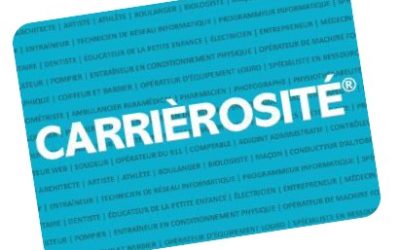Aperçu
Dans cette leçon par HabiloMedias – Faux que ça cesse – vérifier l’information en ligne, vos élèves de français langue seconde développeront leur pensée critique et la résolution de problèmes en participant à des activités d’apprentissage qui explorent quatre étapes rapides et faciles pour aider à vérifier l’information en ligne. Après avoir pratiqué ces quatre étapes, ils réaliseront un message d’intérêt public en français visant à enseigner l’une de ces étapes et à faire passer le message qu’il est nécessaire pour tout le monde de vérifier les faits de l’information en ligne.
Les élèves:
- Apprendront les étapes simples de la vérification de l’information en ligne en français
- S’entraîneront à vérifier des informations en ligne en français
- Créeront un texte médiatique en français dans le but d’informer
- Interagiront et communiqueront efficacement en français pour partager des informations oralement en fonction de l’intention de la situation
- Renforceront leurs compétences littéraire, numériques et globales.
Overview
In this lesson by MediaSmart – Faux que ça cesse – vérifier l’information en ligne, your French language learners will strengthen their critical thinking and problem-solving skills by participating in learning activities that explore four quick, easy steps to help verify online information. After practicing these four steps they will create a public service announcement in French aimed at teaching one of these steps and spreading the message that it is necessary for everyone to fact-check online information.
Students will:
- Learn simple steps for verifying online information in French
- Practice verifying online information in French
- Create a media text in French for the intention of informing
- Interact and communicate effectively in French to share information orally based on intention of the situation
- Strengthen their French literacy, digital and global competency skills
NB curricular connections
Example: Middle block Grade 8 EFI French Immersion Language Arts
Strand: Speaking and Listening- Big Idea: Oral comprehension – Skill Descriptor: Demonstrate understanding of increasingly complex oral texts on a variety of topics using comprehension strategies. Big Idea: Oral production and interaction – Skill Descriptor: Share information, knowledge, ideas, and opinions on a variety of topics using various types of presentations and/or exchanges.
Strand: Reading and Viewing- Big Idea: Comprehension – Skill Descriptor: Critically engage with a variety of more complex and diverse texts using comprehension strategies.
Strand: Writing and representing- Big Idea: Written production – Skill Descriptor: Write different types of texts about a variety of topics using the writing process
CEFR ZONE B1
Middle level Personal Wellness:
Strand: Wellness- Big Idea: Personal Safety – Skill Descriptor: Explain how media and technology influence health and well-being.
What you’ll need
- Download the HabiloMédias FAUX que ça çesse: Vérifier l’information en ligne educator resource package attached. This digital resource will provide all the links to the slides, videos and printable resources that are needed
- Devices for your learners, with access to the internet and software programs to create digital media content.
Instructions
- Start by asking students if they have ever been unsure about whether something they saw online was real or not? What if anything, have they done to find out? Have they ever shared anything they weren’t sure was true? If so, how did they decide whether or not to share it? Point out that we are all part of misinformation problem when we share things we aren’t sure are true.
- Explain to students that we can use 4 easy steps to verify the validity of information being shared online.
- Use tools to verify facts (preferably on a connected device)
- Find the source
- Verify the source
- Check other sources
3. Use the resources provided in the package (links to powerpoint slides, videos and tip sheets) as you explore each step and complete the associated activities with your students.
4. Provide extra language learning supports as needed and model how to apply reading comprehension strategies if the text is too high of a level for your learners.
5. Explain to students that it’s not enough for them to have learned to make fact-checking a habit, because all of us have a role in whether or not misinformation spreads, they have to teach others how to do it as well by preparing a public service announcement (PSA).
6. Explain that a good PSA does 3 things: it makes the reader aware of the issue, gives them a reason to care about the issue and gives them useful information to help them address the issue. Use the digital resources provided to help deepen further understanding of this topic and reflect on importance of creating for a target audience. Invite learners to also share their ideas on what makes a good PSA.
7. Distribute the included assignment sheet to your leaners (in groups or individually). Their task is to create a public service announcement that will teach their fact-checking steps. Encourage learners to be creative and select media format of their preference!
8. Review assignment expectations and provide any additional language supports that may be needed such as key vocabulary, sentence starters, a mur thématique. Invite learners to co-create the criteria for success for the assignment with you.
9. Have students present their PSAs to the class, by explaining the audience they chose, and the choices they made to target their PSA to that audience.
Reflection Activity
- See reflection tools attachment for possible ideas that are suited for your middle or high school level FSL learners.
Global Competencies
What We Teach: Being and Becoming Globally Competent – NB Curriculum Framework (nbed.ca)
CL, CM, CTPS, SGC
Extension Ideas (optional)
- Explore more bilingual resources on the MediaSmarts/Habilo Medias website, to further deepen your language learners digital and global competency skills.
- Encourage learners to record evidence of their learning and language skills in a myBlueprint digital portfolio.
Attachments
- French resource package, including lesson plan details and Power Point presentations.
- Reflection tools for 6-12 FSL
Acknowledgements
- MediaSmarts | MediaSmarts
- Research: Canadian Association of Second Language Teachers reflexions-2024-43-2.pdf (caslt.org)




